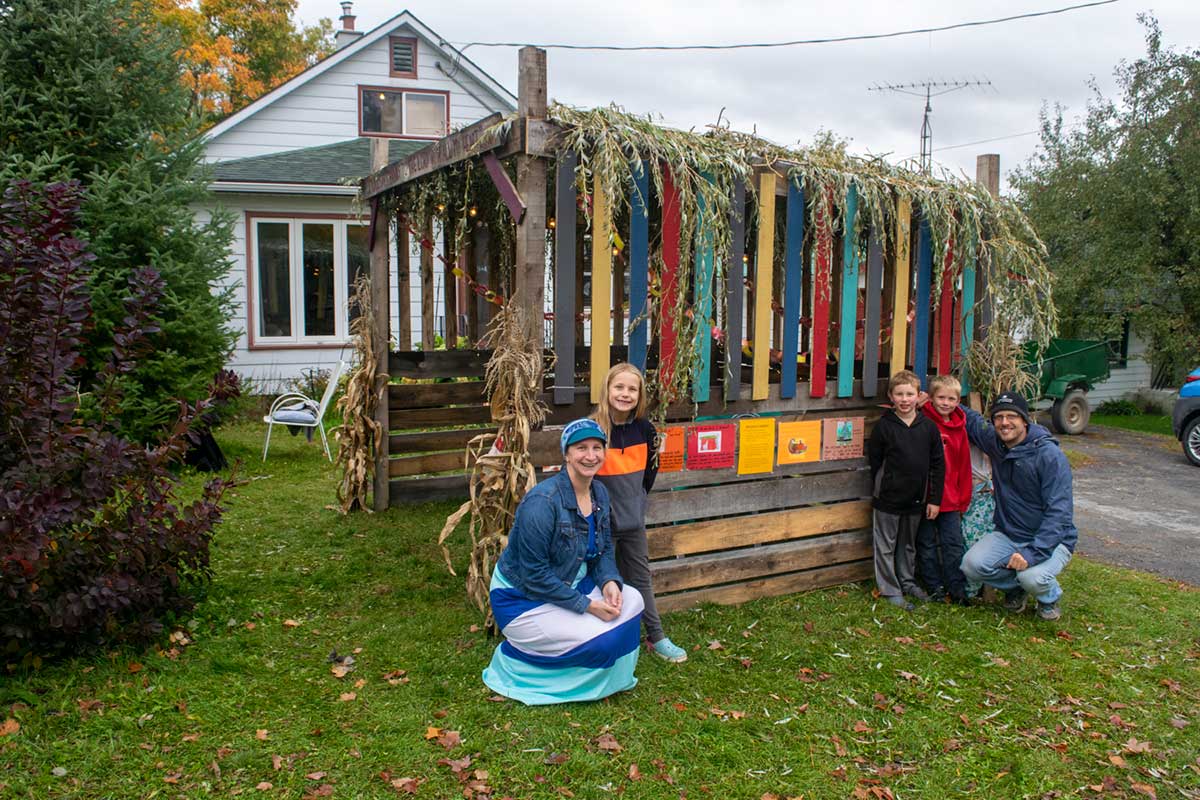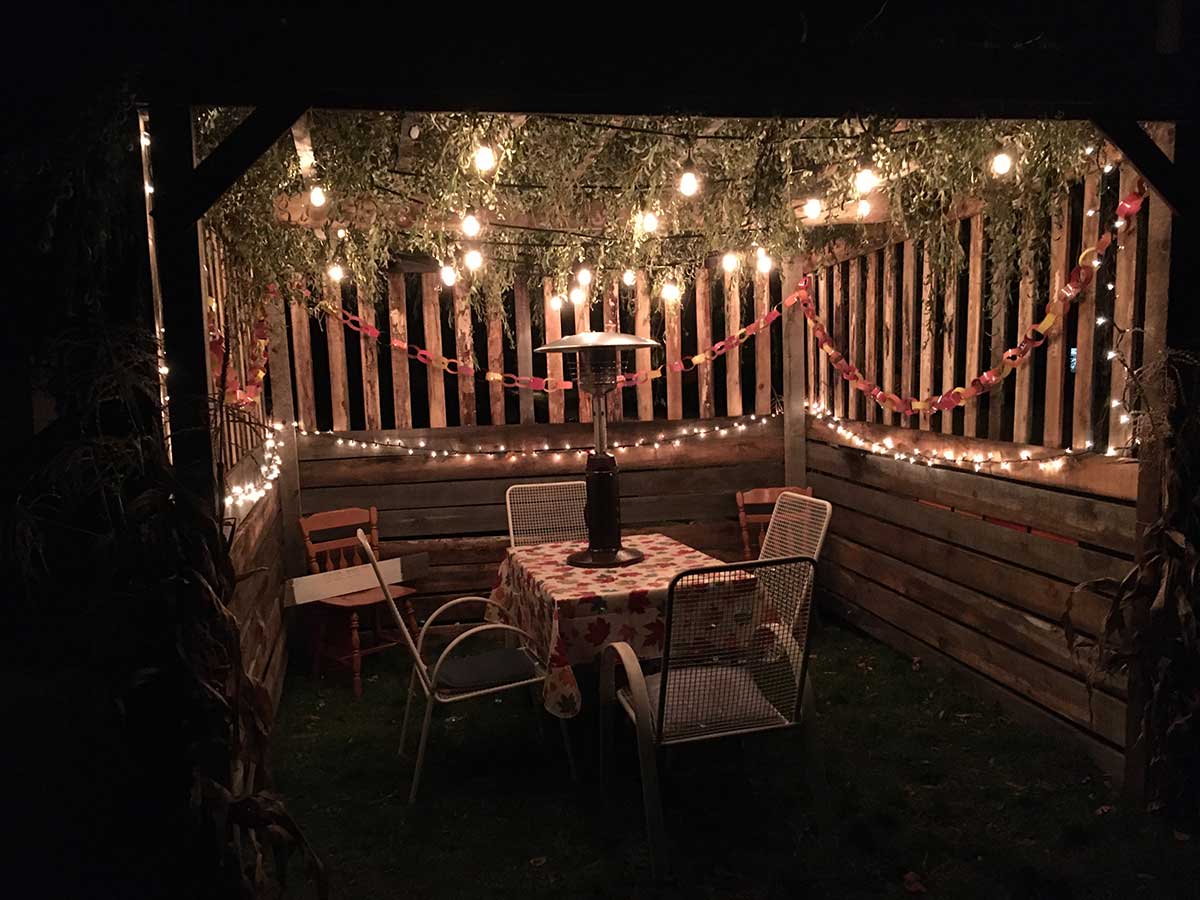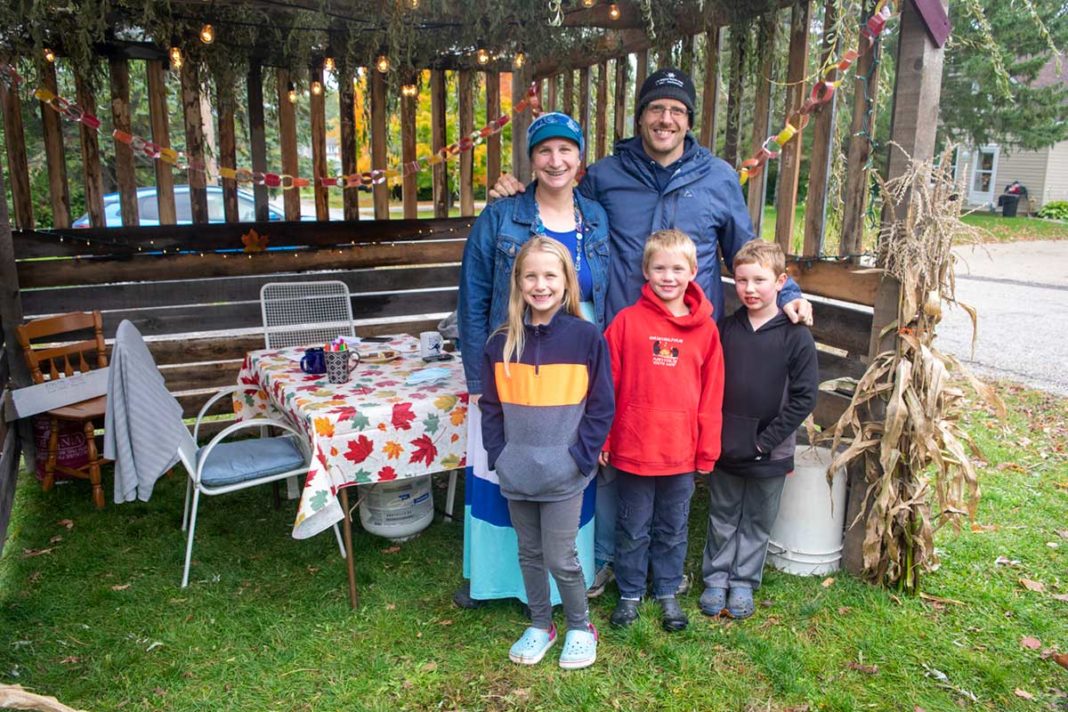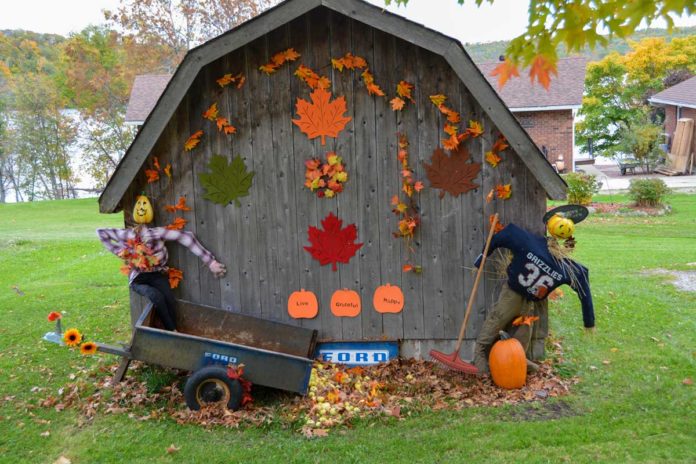Thanksgiving blessings
MINDEMOYA – Early October on Manitoulin Island brings longer nights, crisp fall air and a feeling of hesitation as the hot summer fades into an icy winter. Against the growing dim of the evening, a Duke Street yard in Mindemoya comes to life with the sounds of laughter, conversation and a family breaking bread in a wooden booth as its warm incandescent glow spills out upon the fallen leaves in their yard.
This temporary structure of rough-sawn boards and a willow branch roof is a sukkah (a Hebrew word that means ‘booth’). It’s a family tradition with biblical roots that aligns roughly with Thanksgiving and has added a unique significance to harvest time on Manitoulin Island.
“We build one of these every year. It’s a temporary structure to live in and remind us of the simple principles and to be thankful of what we have been provided; it’s a reminder that everything in life is temporary,” says Tim Styles, the family’s patriarch.
“It’s in the spirit of gratitude. It’s easy to complain about the things in our lives but it’s so important to appreciate what we do have, and to give back and serve others,” adds his wife Hadassah Styles.
Long before modern-day Thanksgiving, there was Sukkot, an Old Testament celebration that translates to the Feast of Booths or Feast of Tabernacles (sukkot being the plural of a sukkah). It commemorates Hebrews’ exodus from Egypt and is a way of offering thanks to God for their salvation.
The Israelites left Egypt and had to sleep rough in booths such as this. They had few comforts and possessions and relied on their faith in God to survive the hardships.
The sukkah’s core purposes are to inspire joy and thankfulness to share with friends, family and neighbours at the end of the harvest, to affirm that God has provided for all of one’s needs in the past and will do so in the future, and reminds those who dwell within its walls that life is a temporary journey.
Although Sukkot has Jewish origins, Mr. Styles and his family have incorporated it into their Christadelphian faith. For the past five years, the family has built this structure at their home near Armstrong, BC, where they reuse the same wood every year.
Mr. Styles, who has a degree in architecture, works from home in the computer software industry.

They moved temporarily to Manitoulin on Thanksgiving of 2019, around the time of the festival, but they skipped the annual construction for that year.
They came to Mindemoya to help care for Linda Wilton, a fellow Christadelphian who was beloved by the global faith community. She faced an aggressive strain of cancer and passed on September 10 of this year.
Upon their arrival, the family was unsure of where they would live, especially given Manitoulin’s limited rental housing market.
“We put it to prayer and the next morning we got a call from the people who owned this house, Joan and Willis Sheppard, who said they would be able to rent us this place right across the street from Dan and Linda (Wilton) while we helped take care of her,” says Ms. Styles. “The spirit on the Island is incredible. You’d be hard-pressed to find it anywhere else in the world.”
This is not their first time on Manitoulin—the Styles first met when they attended the Mindemoya Christadelphian youth camp some years ago.
The tough circumstances surrounding Ms. Wilton’s death were all the more reason to bring their tradition to Ontario, especially to support members of their faith community.
“We wanted this to be a reminder of God’s commitment to us and our families during this hard time,” says Ms. Styles.
Fellow Christadelphian Joe Cooper of Cooper Wood Products donated the lumber for the sukkah. Willow branches make up the roof; it is the only sacred plant in Sukkot (as described by Moses) found locally.
Ms. Styles sourced the branches from Deb’s Unisex Hairstyling at the end of their street. They serve as a reminder of the impermanence of life as they slowly wilt during the week.
The Styles have adapted the tradition to the local climate from its traditional Mediterranean roots.
“In Israel today, people eat and sleep in their sukkahs. However, it is much colder in Northern Ontario so we just have our meals and visit in our sukkah,” Mr. Styles says.
Sukkot is not a ubiquitous celebration but Mr. Styles says some Jewish neighbourhoods in Michigan, his birthplace, feature sukkahs in nearly every yard.
The Styles have added a small heater for when visitors stop by and their children have become fast friends with the Wilton kids across the street. They spend many hours running around their homes and going on adventures around the Island.
As Christadelphians, the Styles say this tradition offers perspective on the values of their own faith.
“The kids love it when it’s time to build the booth; we make challah bread every year, build the booth and collect branches for it … it’s a great opportunity to teach our kids some important principles,” said Ms. Styles, adding that teachings are not necessarily religious in nature.

“I grew up in a large family and we didn’t have a lot of money but we had great traditions every holiday. As kids, having money doesn’t really matter that much as long as you can make a holiday special and perform traditions consistently every year. They can really grow to mean something to your children and make memories for their whole lives,” she said.
The spirit of Sukkot is perhaps more important than ever in a season when the Styles and their fellow siblings in Christ have said a final goodbye to the late Ms. Wilton.
She completed international missionary work and was a major organizer of gatherings and celebrations both locally and on a broader scale, including a virtual youth camp for some 400 children in her final summer.
“It’s been a hard time for us with Linda having died, but we’re very thankful for all that God has provided to us in the past and we have confidence that he will continue supporting us in the future and that we’ll see Linda again,” says Mr. Styles.
“There’s that old saying that grief is the price you pay for love. We’re so thankful for Linda’s example and what she gave to us,” adds Ms. Styles.
The sukkah draws a considerable amount of attention from passers-by who are curious and supportive of the effort. The family says they enjoy explaining their tradition to strangers over a shared cup of tea or coffee.
Their children have made a series of informative posters on the street-facing wall to explain their practice when they are not present.
Sukkot ends on Friday, October 9 this year (its dates are based on the Hebrew calendar and always fall in the September-October timeframe). After the festival, the family says they are not sure what they will do with the wood but will find a good home for it.
They will keep one board, however; a rough-sided piece with white paint on which visitors are invited to sign their name. The Styles plan to bring it back to BC when they return and add those names to their home collection—memories of a difficult but important year in their family’s fall tradition.





